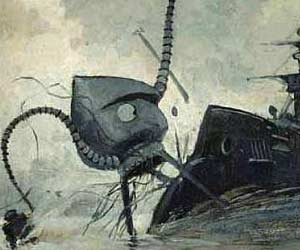Food of the Gods
Select Format
Select Condition 
Book Overview
What happens when science tampers with nature? A riveting, cautionary tale with disastrous results reveals the chilling answer.Hoping to create a new growth agent for food with beneficial uses to... This description may be from another edition of this product.
Related Subjects
Classics Fantasy Fiction Literature & Fiction Science Fiction Science Fiction & FantasyCustomer Reviews
Boom food forever
The Human Society is about to change...
Quite good
Prescient
The science is real,and the characters come alive
The Food of the Gods and How It Came to Earth Mentions in Our Blog

A hundred years ago, novelist H.G. Wells predicted that science would be "king of the world." Titanic's Jack Dawson may take issue with that claim, but he’d have a tough time disputing the compelling influence Wells had on politics, society, and the future that extended far beyond the literary realm. Considering Wells is one the founding fathers of sci-fi (along with Jules Verne and Edgar Rice Burroughs) and the author of The Time Machine, The Invisible man, The Island of Dr. Moreau, and The War of the Worlds, that's saying something.





